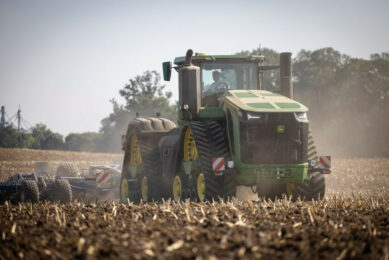John Deere: Fully autonomous and electric tractor (75-100 HP) by 2026

Deanna Kovar, President of John Deere’s Worldwide Agriculture & Turf Division for Europe, Asia, and Africa, shares the company’s forward-looking strategy. In an exclusive interview with Future Farming, she discusses the development of autonomous and electric-powered machines, precision agriculture, and the vital role of dealers in supporting farmers. “Our focus is on delivering complete solutions that help farmers produce more with less, and in a sustainable way.”
For Deanna Kovar, CEO of American machinery manufacturer John Deere, it’s all about capabilities, strong leadership, and excellent customer support, both in technology and engineering. “Today’s dealers don’t just sell horsepower. We and they now play a broader role in helping customers embrace modern technology that reduces the use of chemical inputs and increases yields through more precise techniques.”
“Dealers must not only ensure maximum uptime and reliability of customers’ machines but also help farmers fully utilize modern technology. We invest not only in technology for agricultural machines but also in the technology our dealers need to support farmers. Customers who request it can equip their tractors and other machines with fully connected support, centralized through their dealers and John Deere. This isn’t just about maximizing service but also efficiency by helping to optimize operations.
Ultimately, customers will tell us whether we are successful in restructuring our dealership network based on how they perceive their engagement with the network and with John Deere machines and technology.”
“Historically, our company was organized into business units like tractors, combines, and crop protection. Three years ago, we took a different approach. We put the customer at the center. After all, you need more than just a good combine to serve arable farmers.
We reorganized around the work farmers do. This has made a big difference because we now think in terms of ‘how can we help farmers plant better?’ instead of ‘how do we make the best planter?’. This fosters collective thinking about the entire package, including the tractor, technology, and the farmer’s goals.
We are electrifying our products up to a certain size and have already committed to a fully autonomous, fully electric tractor of 75-100 horsepower by 2026
We are also fully open to collaboration with other companies, for example, through compatibility with Isobus and data systems. While we promote the advantages of combining John Deere implements with John Deere tractors, we must acknowledge that mixed-brand fleets are a reality—especially in Europe. The John Deere Operations Center, the most open digital farming platform in the world, has over 250 connected software companies. This openness continues to drive our digital strategy.”
“Although I expect a slight market contraction, there is still potential for farmers to remain profitable. I am optimistic about the future of agriculture, given the growing global population, improving dietary habits worldwide, and the increasing demand for agriculture-produced fuels. The only way to produce more with less, in a way that society accepts, is through greater precision. Therefore, technology to better utilize machines and land will remain a focus.”
“We won a gold medal at Agritechnica for the eAutoPowr, a transmission that uses the power of our current engines more efficiently. We are also collaborating with manufacturers like Joskin to leverage this technology.
In terms of fuel, our strategy is clear. We are electrifying our products up to a certain size and have already committed to a fully autonomous, fully electric tractor of 75-100 horsepower by 2026. For larger machines, we are investing in hybrid technology. We believe agriculture can contribute to tackling CO2 challenges with biofuels.”
“We are committed to a fully autonomous production system for arable farming by 2030. So, I expect key machines will be able to operate autonomously. Will they look different? Some will, some won’t. That remains to be seen. We are taking a careful approach.
In 2022, we introduced a series of goals to unlock value, sustainability, and productivity for our customers. In Europe, we have a unique opportunity because farming here is closer to the population than in many other regions. We can demonstrate the benefits of technology for producing sustainable food for a growing global population.”
Co-author: Martin Rickatson
Join 17,000+ subscribers
Subscribe to our newsletter to stay updated about all the need-to-know content in the agricultural sector, two times a week.



